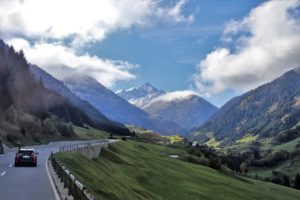The European Green Deal calls for a 90% reduction in greenhouse gas emissions from transport, in order for the EU to become a climate-neutral economy by 2050. To achieve this objective, the European Commission published in December 2020 its Strategy for a Sustainable and Smart Mobility. The Strategy aims at greening European transport schemes by reducing dependence on fossil fuels, increasing the number of zero-emission vehicles in operation, doubling the number of high-speed trains by 2030 and doubling rail freight by 2050, among other measures.
Euromontana welcomes the objectives but regrets that the challenges of rural mobility are not clearly and directly addressed and fears that mountain people will be left behind in the transition to sustainable mobility.
Proposals for rural mobility to be announced in the EU Long-Term Vision for Rural Areas
The European Commission’s communication sets as an objective to enhance the availability and affordability of transport in rural and remote regions. In particular, the Commission insists on a fairer mobility by making transport more accessible to people with reduced mobility. Euromontana certainly welcomes these objectives but regrets that so far, no concrete measure is put forward to improve connectivity in our territories, as the Commission wishes to await the publication of its Long-Term Vision for Rural Areas in June 2021.
One of the European Commission’s main objectives through this Strategy is for instance to complete by 2050 the Trans-European Transport Network (TEN-T). If the Commission affirms that this “will be achieved while maintaining accessibility for rural and remote regions”, no concrete announcement has been put forward for the moment to develop accessible and sustainable transport in mountain areas.
 As explained in Euromontana’s Long-Term Vision for Mountain Areas, mobility plays an important role in the attractiveness of a region. No matter how much effort is spent on education, promotion of tourism, development of new economic initiatives, etc.: accessibility remains a key to success for development initiative. We therefore call on the European Commission to propose in its upcoming Long-Term Vision for Rural Areas concrete and detailed measures to ensure the accessibility of sustainable transport modes in mountain areas.
As explained in Euromontana’s Long-Term Vision for Mountain Areas, mobility plays an important role in the attractiveness of a region. No matter how much effort is spent on education, promotion of tourism, development of new economic initiatives, etc.: accessibility remains a key to success for development initiative. We therefore call on the European Commission to propose in its upcoming Long-Term Vision for Rural Areas concrete and detailed measures to ensure the accessibility of sustainable transport modes in mountain areas.
Multimodality and rural-urban linkages
The EU Strategy for a Sustainable and Smart Mobility also intends to promote multimodality to facilitate the use of different transport modes. To do so, the European Commission wants to revise the Urban Mobility Package, in view of providing more guidance on mobility management at local and regional level, including on better connectivity with the surrounding rural areas.
Euromontana welcomes the intention to enhance rural-urban linkages in mobility to provide commuters with more sustainable and simple options, including in cross-borders areas. However, the means proposed by the Commission, through the revision of the Urban Mobility Package, is a risk of generalising the measures applied to urban mobility without taking account of the specific features of mobility in rural areas (fewer and more scarce people, longer distances, costs of the infrastructures in mountains). Therefore, Euromontana calls on the European Commission to propose in its Long-Term Vision for Rural Areas the adoption of an ambitious Rural Mobility Package, which would detail measures for the development of sustainable transport in rural areas and addressing the specific challenges in remote, mountainous, and sparsely populated territories, such as the viability of transport schemes.
Rail: opportunities for freight, not mountain people
Other objectives and measures of the Strategy are to be welcomed, such as the wish to green freight transport by doubling rail freight traffic by 2050. In the Alpine Space is for instance, one-third of the 40 million tons of goods transported each year conveyed by trucks through mountain areas. The development of rail freight would therefore help decreasing the number of trucks, whose heavy traffic in the valleys affects the climate, the environment, and the air quality in the mountains.
On the other hand, if the Commission sets the objective to double by 2030 the high-speed rail traffic, policymakers make no proposal regarding small railway lines. Euromontana reaffirms the need to maintain and develop those lines to make alternatives to the car truly available and encourage the use of rail transport for short and daily journeys, and not only between major European cities.
Euromontana recognises various positive points for more sustainable mobility in Europe. Yet, the daily mobility of mountain citizens could be further improved. Euromontana regrets that the issues related to rural mobility are not directly included in this new Strategy. If Euromontana supports the European Commission’s initiative to present a Long-Term Vision for Rural Areas, not all issues can be effectively addressed in this upcoming communication. Rural mobility cannot be approached solely through the prism of rurality; it is necessary to apply a real rural proofing to all policies, including mobility ones, in order to strengthen rural-urban linkages and not increase disparities in mountain areas.
For more information on our proposals for mobility in mountain areas, please see our contributions:
- “The EU Strategy for a Sustainable and Smart Mobility – Bringing mountain territories into the transition”
- “The European Year of Rail – Make it work for mountainous regions”
- “Towards a Long-Term Vision for Mountains’ Rural Areas”










